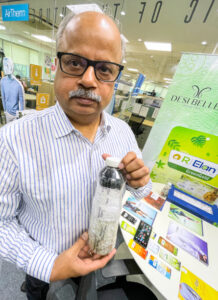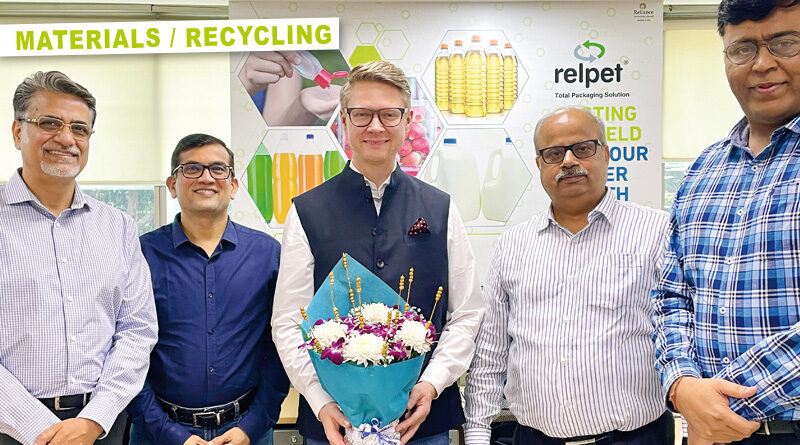PET raw material and recyclate from India
A conversation with India’s largest private company
December 9, 2022, Reliance Industries Ltd.
We met:
Mr Bharat B Mehta, Vice President – PET Marketing
Mr Rakesh Bali, Senior Vice President, Head Marketing (Petchem)
Mr Raghunath Datar, Regional Manager
Mr Rajiv Kumar, AVP – PET Marketing
Mr Aditya Pahurkar, Manager Sales & Marketing (PET)
Mr Shubhang Shanbag, Manager Sales & Marketing (PET)
Reliance Industries Ltd (RIL) is the largest private sector company in India. Founded in 1966, the corporate giant today houses Petchem (petrochemicals), Jio (telecom), Retail (around 15,000 retail outlets), Hydrocarbon Exploration and Production and Refining (petroleum). As of year-end 2022, Reliance became the first Indian company ever to achieve a turnover of more than US $ 100 billion. Petchem business, which includes the plastics division, accounts for about 35% of total sales. In addition to its PET brand “Relpet”, Reliance also produces PP, PE and PVC. The PET material production division, the company points out, is fully integrated thanks to its refining division, as everything from crude oil to finished PET production is carried out under one corporate umbrella. In Mumbai, PETplanet met the Reliance team to discuss the company’s current and future developments in PET.
PET material production
The meeting point for our discussion was a meeting room at the Reliance Jio Infocomm site in Mumbai’s financial and business district BKC. There, the team led by Senior Vice President & Head of Marketing at Petchem, Mr Rakesh Bali and Vice President for PET Marketing, Bharat B Mehta welcomed us. Mr Mehta began by explaining where the company is headed in the future in terms of PET manufacturing and postconsumer PET bottle recycling: “We currently have a total capacity of manufacturing 1.15 million t/a of virgin food grade PET. The capacity is spread in India and Malaysia, with Indian manufacturing plants in Hazira, Surat which has 350 kt capacity and Dahej, Bharuch with 650 kt. The remaining 150 kt is produced at our plant in Malaysia.” RIL also produces 6 kt/a of food grade rPET under its brand “Relpet green” at Nagothane facility. This puts the company in first place in India for PET production, followed by IVL Dhunseri with 720 kt and JBF with just over 180 kt. A unique pilot project of rPET resin, which is to be commercialised in the later part of 2023, is currently in the test phase: it involves traceability of PET material via integrated markers in finished blown bottles for the purpose of tracking material flows.
Bottle and material demand
Currently, about 1.2 million tonnes of PET bottles are consumed in a year across India and are expected to grow by 20% by the end of 2022, according to Reliance. Commenting on this, Bharat Mehta said, “Glass prices have gone up by 60% due to which many bottlers have switched to PET bottles, especially in CSD, milk and liquor.” The increasing demand for material is due to the continuing trend towards smaller bottle sizes due to “shrinkflation”, which refers to shrinking the size of the pack to keep the product affordable in times of inflation. He added: “A 2 l bottle uses 54 g of material whereas eight 0.25 l bottles each use 10 g of material, a total of 80 g which results in 26 g more usage.”

Post-consumer waste, PET recycling and EPR
Things are also happening in the recycling sector. “For PET recycling, we maintain three sites in the states of Punjab, Uttar Pradesh and Maharashtra,” says Mr Mehta. “With bottle recycling start-ups in Hoshiapur in Punjab and Barabanki in Uttar Pradesh in early 2000s, we began to produce synthetic fibres from postconsumer PET bottles. In each of these two locations, bottle bales are recycled into flakes and then into polyester staple fibre (PSF). The capacity is 50 kt and we plan to expand to 80 kt. The plant in Nagothane, Maharashtra, has been producing rPET resin since 2010.” Currently, it is producing 6 kt/a there, but expansion plans in rPET envisage an increase to 35 kt by 2025.
This is a logical step, especially against the background of the draft “Food Safety and Standards Packaging (Amendment) Regulations” issued by the Food Safety and Standards Authority of India (FSSAI) in June 2022. After years of discussion, the draft provides for approval of recycled PET in food contact and is currently being reviewed by The Bureau of Indian Standards. Industry experts expect the finalisation of rPET standards in 2023. India is one of the countries with the highest PET recycling rate. Around 90% collection rate of the aforementioned 1.2 million tonnes of bottles can be recorded in the market. A large part of the bottles is collected by an unorganised sector of waste collectors and taken to collection points and then to recyclers, for which they receive 15-20 rupees per kg of material and often earn their living with it. By means of manual sorting, the bottles are then separated according to colour and foreign materials are removed. Industry is transforming in India as more and more companies and small businesses are coming forward in PET bottle collection business, resulting in reduced share of unorganised sector.
“This is also an important part of the much-discussed EPR,” says Mr Rakesh Bali. “Brand owners could hire or at least pay the waste pickers in the long run. EPR also plays a pivotal role for us as a producer. The industry provides direct and indirect employment to over 400,000 people. We are providing technological know-how and guidance to encourage more entrepreneurs to come forward to become part of the industry.

